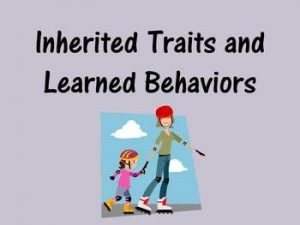 We inherit from our parents. Not just goods and property, but genes.
We inherit from our parents. Not just goods and property, but genes.
We carry the bloodlines of our ancestors and all that accompanies them as physical attributes, medical conditions and even elemental mental tendencies.
Some characteristics are prominent, some fade and others might re-emerge in downstream generations.
We pass such things from generation to generation as we evolve.
But that is not all that passes forwards.
I believe the IMPACT of our Behaviors transfers from generation to generation, too. And it is also capable of crossing blood-lines to non-familial contacts.
We do and say things that strongly influence others. And often more profoundly than we realize; frequently we are completely unaware of our impact.
Behaviors and attitudes surround us as we live out our chosen lives under the overwhelming influences of cultures and societies in which we are immersed.
As children we are influenced and affected by events, strong impressions and surroundings. This will occur whether-or-not a parent is present or even exists.
And, this Resultant is not about bloodlines.
Exactly how strongly any new effect takes hold on an individual is influenced by genetic make-up and predisposition. Engulfing or dramatic events can have overwhelming impacts.
The net result is our Behavior being affected by experiences.
The more insidious prospect is that we then carry forward our own resulting behaviors which can influence others.
Inevitably, everyone we contact will be exposed: colleagues, workers, spouses, children, relatives, friends etc.
When we closely associate with others over prolonged periods their exposure to and likelihood of adopting (or being influenced by) a Transferred Behavior, increases.
Long-term working relationships have us swimming in one another’s Behavior Pools. Inevitably, children are subjected to major immersion within the home.
Where such exposure is positive and advantageous, perhaps all is well. It is almost Darwinian in nature and helps the most fit (best suited) prosper and survive.
But what if the observable behavior is inherently negative or harmful? Some behaviors are useful if experienced in moderation yet prove damaging when consumed in excess.
Imagine (say) a child having suffered some harm from a stranger. He/she may either develop (say) a healthy wariness of new acquaintances until validated or acquire a dysfunctional and visible distrust of others, as a consequence.
Eventually this same child grows up closely interacting with others and in time (say), his/her own offspring. This (now adult) person will strongly (or weakly) imprint their own learned resultant behavior on others. Why would they not.
Again, everything is fine if the behavior is positive and helpful. But if it is not?
We all have strongly imprinted behaviors. Many we have learned or absorbed from parental or other significant influences in our lives.
Not all our behaviors (or Beliefs, too) are sound, appropriate and constructive in our lives. Many may be so, but certainly NOT ALL. So, it’s important we can recognize our behaviors (or, opinions, too) for what they are and preferably understand or decipher their origins.
What of the influences that pre-date our conscious memory?
Many people are unfortunately traumatized when very young. Memories are then not always formed or might even be suppressed in such cases.
And yet it is likely we will begin to demonstrate related behaviors and traits in our personalities as a direct result of these significant events.
More troubling is our legacy.
If our behavior is affected these same behaviors and their consequences can be transposed onto others.
This might be a positive advantage or be equivalent to passing contagion; like spreading a disease forward and outward to others.
Let’s consider this effect with a positive example…
Imagine a small child out with parents during Summer holiday on a sunny beach. Child wanders off roaming carelessly and unafraid for an hour or more. Parent has been following quietly at a distance making sure all is well, safe and child is not distressed or concerned.
Eventually parent quietly and re-assuringly approaches child without rapprochement and caringly asks how they’re doing, what they saw, etc. Risks and dangers of wandering off alone are covered calmly and rationally at another time.
The result: Child grows to adulthood always open to exploring the world and new places. He/she then passes same mentality along to own children who also explore and travel.
So here we have it. The behavior (and attitude) is passed along; through generations and to others indirectly exposed or influenced… almost like a gene when within the familial group.
We can similarly envisage a negative outcome to the same events… screaming, panicked parent grabs-up wandering child, scolds them relentlessly, inflicting fear of getting lost or being carried off.
Imagine how that child will likely (not certainly, perhaps) grow regarding adventure, travel and exploration of the new and unknown.
More troublingly, consider the likely future influence they then might unwittingly exert upon the development of others, downstream.
Behaviors (and Attitudes) can be sticky, persisting over time and through generations.
Realistically, can we completely shut down irrational or unwarranted behaviors in our self? Perhaps not, but if they are detrimental or limiting to us or others we should try.
We can advise and instruct others against following us too closely on affected matters. This has greater impact if underlaying reasons for our traits and propensities can be explained; sometimes social norms and relationships can make this approach difficult or simply not viable.
In the end it is hard to fully prevent the carry-forward impacts of our actions and behaviors.
But, we must try.
Are you passing along attitudes that others would be better without? Are your behaviors an unhelpful legacy? Review the most basic interactions you have with people. Are there unfortunate elements that may have undesirable, lasting effects?
As a minimum, take actions with yourself to best help and guide the people that matter to you most.
Ian R. Mackintosh is the author of Empower Your Inner Manager Twitter@ianrmackintosh

